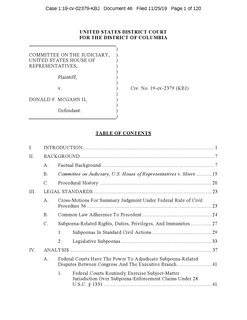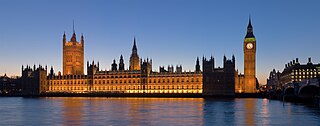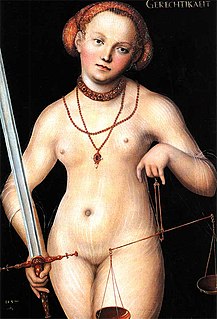 W
WA constitutional referendum was held throughout Turkey on 16 April 2017 on whether to approve 18 proposed amendments to the Turkish constitution that were brought forward by the governing Justice and Development Party (AKP) and the Nationalist Movement Party (MHP). As a result of its approval, the office of the Prime Minister was abolished and the existing parliamentary system of government was replaced with an executive presidency and a presidential system. The number of seats in Parliament was raised from 550 to 600, while, among a series of other proposals, the president was given more control over appointments to the Supreme Board of Judges and Prosecutors (HSYK). The referendum was held under a state of emergency that was declared following a failed military coup attempt in July 2016.
 W
WThe term Fourth Estate or fourth power refers to the press and news media both in explicit capacity of advocacy and implicit ability to frame political issues.
 W
WGovernment by Judiciary is a 1977 book by constitutional scholar and law professor Raoul Berger which argues that the U.S. Supreme Court has interpreted the Fourteenth Amendment of the U.S. Constitution contrary to the original intent of the framers of this Amendment and that the U.S. Supreme Court has thus usurped the authority of the American people to govern themselves and decide their own destiny. Berger argues that the U.S. Supreme Court is not actually empowered to rewrite the U.S. Constitution – including under the guise of interpretation – and that thus the U.S. Supreme Court has consistently overstepped its designated authority when it used its powers of interpretation to de facto rewrite the U.S. Constitution in order to reshape it more to its own liking.
 W
WIn re: Don McGahn is a U.S. constitutional case lawsuit (1:19-cv-02379) filed in the United States District Court for the District of Columbia by the House Judiciary Committee to compel the testimony of former White House Counsel Donald F. McGahn, Jr. under subpoena. McGahn was put under subpoena to testify regarding his knowledge of the Russia investigation and Mueller Report and whether President Donald Trump's actions could constitute obstruction of justice. The case gained importance as the House launched impeachment proceedings against Trump regarding the Trump–Ukraine scandal.
 W
WThe judiciary is the system of courts that adjudicates legal disputes/disagreements and interprets, defends, and applies the law in legal cases.
 W
WA legislature is an assembly with the authority to make laws for a political entity such as a country or city. They are often contrasted with the executive and judicial branches of parliamentary government in the separation of powers model.
 W
WThe Northern Ireland Act 2014 is an act of the Parliament of the United Kingdom. It was passed with the intent to ban dual mandates for Members of the Legislative Assembly (MLAs) and to bring the Northern Ireland Assembly's elections into line with the other British devolved legislatures. It received Royal Assent on 13 March 2014.
 W
WThe rule of law is defined in the Oxford English Dictionary as "[t]he authority and influence of law in society, especially when viewed as a constraint on individual and institutional behavior; (hence) the principle whereby all members of a society are considered equally subject to publicly disclosed legal codes and processes." The term rule of law is closely related to constitutionalism as well as Rechtsstaat and refers to a political situation, not to any specific legal rule.
 W
WA semi-presidential system, or dual executive system, is a system of government in which a president exists alongside a prime minister and a cabinet, with the latter two responding to the legislature of the state. It differs from a parliamentary republic in that it has a popularly elected head of state who is more than a ceremonial figurehead, and from the presidential system in that the cabinet, although named by the president, responds to the legislature, which may force the cabinet to resign through a motion of no confidence.
 W
WSeparation of powers in Singapore is founded on the concept of constitutionalism, which is itself primarily based upon distrust of power and thus the desirability of limited government. To achieve this, the Constitution of the Republic of Singapore splits the power to govern the country between three branches of government – the legislature, which makes laws; the executive, which executes them; and the judiciary, which enforces them. Each branch, while wielding legitimate power and being protected from external influences, is subjected to a system of checks and balances by the other branches to prevent abuse of power. This Westminster constitutional model was inherited from the British during Singapore's colonial years.
 W
WA sword of justice is a ceremonial sword that is used to signify a monarch's supreme judicial power. In some cases, this may have been an executioner's sword that was no longer used for executions, becoming instead a ceremonial one.
 W
WSeparation of powers is a political doctrine originating in the writings of Charles de Secondat, Baron de Montesquieu in The Spirit of the Laws, in which he argued for a constitutional government with three separate branches, each of which would have defined abilities to check the powers of the others. This philosophy heavily influenced the writing of the United States Constitution, according to which the Legislative, Executive, and Judicial branches of the United States government are kept distinct in order to prevent abuse of power. This United States form of separation of powers is associated with a system of checks and balances.